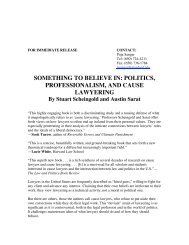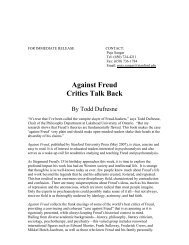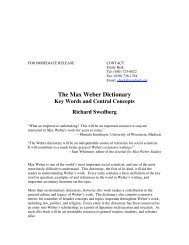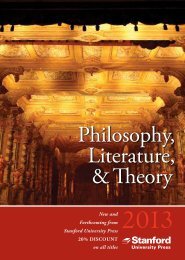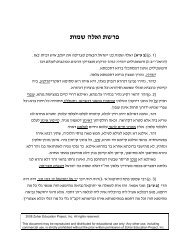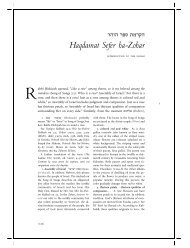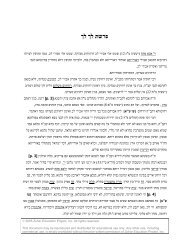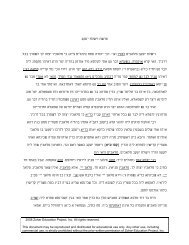Front Matter (PDF) - Stanford University Press
Front Matter (PDF) - Stanford University Press
Front Matter (PDF) - Stanford University Press
You also want an ePaper? Increase the reach of your titles
YUMPU automatically turns print PDFs into web optimized ePapers that Google loves.
place that might call to mind a verse from a psalm or the Song of<br />
similar<br />
with which a homily might then open.<br />
Songs,<br />
very frequent references in the text to the importance of secret Torah<br />
The<br />
at night raises the likelihood that this group of Spanish kabbalists shared<br />
study<br />
some time, as a regular, ritualized activity, a late-night session for the study<br />
for<br />
Kabbalah. If they were anythinglike their ®ctional counterparts, these<br />
of<br />
began after midnight and went until dawn, concluding with morning<br />
sessions<br />
These nightly gatherings (of course there is no way to be certain<br />
prayers.<br />
or for how longthey did take place on an actual level) were omitted<br />
whether<br />
the Sabbath, when it was the companion's duty to be at home with his<br />
on<br />
They reached their annual climax on the eve of Shavu'ot, whenthevigil<br />
wife.<br />
in preparation for a new receivingof the Torah. The intense climax of the<br />
was<br />
narrative is the tale of two great and highly ritualized meetings of<br />
Zohar<br />
and disciples in the Idra, a special chamber of assembly. In the ®rst of<br />
master<br />
two assemblies, three of the companions die in the ecstasy of their<br />
these<br />
devotions. The second, the Idra Zuta or Lesser Assembly, records the<br />
mystical<br />
of Rabbi Shim'on himself and forms the grand conclusion of the Zohar.<br />
death<br />
Scholem once suggested that the Zohar takes the form of a<br />
Gershom<br />
novel.'' This suggestion is particularly intriguing because the Zohar<br />
``mystical<br />
in Spain some three hundred years before Cervantes, who is often<br />
appeared<br />
as the father of the modern novel. One may see the tales of Rabbi<br />
seen<br />
and the companions as a sort of novel in formation, but it is clear<br />
Shim'on<br />
the form is quite rudimentary. When the Zohar wants to express an idea,<br />
that<br />
needs to slip back into the more familiar literary form of textual hermeneu-<br />
it<br />
The novelist in the classic post-Cervantes sense is one who can develop<br />
tics.<br />
or suggest complex thought patterns by means of character development<br />
ideas<br />
plot themselves, rather than by havingthe characters assemble and make a<br />
and<br />
of speeches to one another (though such moments are not entire un-<br />
series<br />
in later ®ction). It might be interesting to place the Zohar into the<br />
known<br />
such works as medieval troubadour romances, Chaucer's fourteenth-<br />
settingof<br />
Canterbury Tales, ortheThousand and One Nights. All of these are<br />
century<br />
cycles, frameworks of story into which smaller units (in these cases<br />
narrative<br />
in the Zohar's case homiletical) can be ®tted. All of them, too, may<br />
narrative,<br />
seen as precursors of the novel.<br />
be<br />
the peregrinations of Rabbi Shim'on and his disciples are more than<br />
But<br />
``story'' of the Zohar, whether ®ctional or maskinga historical reality. In<br />
the<br />
Zohar, everythingis indeed more than it appears to be. Master and disciples<br />
the<br />
represent wanderingIsrael, both the ancient tribes in the wilderness on<br />
way to the promised land, and the people of Israel in their present exile.<br />
their<br />
the ancient rabbis suggest to the would-be scholar to ``exile yourself to a<br />
While<br />
of Torah,'' here exile or wanderingis itself that place. The ``place of<br />
place<br />
is indeed wherever the companions happen to be, the home of the<br />
Torah''<br />
Introduction<br />
lxiii<br />
master or the grove of trees. Said in words that they might prefer, the ``garden''



